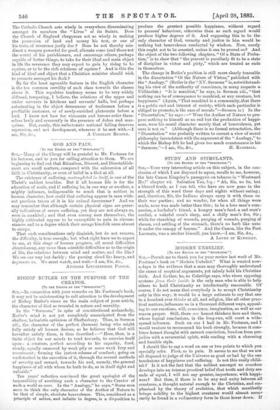BISHOP BUTLER ON THE PURPOSE OF THE CREATOR.
[To THE EDITOR OF THE "SPECTATOR."] Sia,—In connection with your remarks on Mr. Footman's book, it may not be uninteresting to call attention to the development of Bishop Butler's views on the main subject of your article, the character of God as revealed in nature and morality.
In the "Sermons," in spite of constitutional melancholy, Butler's mind is not yet completely emancipated from the shallow, hedonistic optimism of Shaftesbury. Thus, in Sermon xiii., the character of the perfect (human) being who might fully satisfy all human desires, as he believes that God will hereafter satisfy them, is thus described :—" Here, then, is a finite object for our minds to tend towards, to exercise itself upon : a creature, perfect according to his capacity, fixed, steady, equally unmoved by weak pity or more weak fury and resentment ; forming the justest scheme of conduct; going on -undisturbed in the execution of it, through the several methods of severity and reward, towards his end, namely, the general happiness of all with whom he hath to do, as in itself right and valuable."
Ten years' reflection convinced the great apologist of the impossibility of ascribing such a character to the Creator of such a world as ours. In the "Analogy," he says," Some men seem to think the only character of the Author of Nature to be that of simple, absolute benevolence. This, considered as a principle of action, and infinite in degree, is a disposition to produce the greatest possible happiness, without regard to persons' behaviour, otherwise than as such regard would' produce higher degrees of it. And supposing this to be the only character of God, veracity and justice in him would be nothing but benevolence conducted by wisdom. Now, surely this ought not to be asserted, unless it can be proved so ? And the object of the two following chapters, "Of a State of Proba-- tion," is to show that "the present is peculiarly fit to be a state of discipline in virtue and piety," which are treated as ends in themselves.
The change in Butler's position is still more clearly traceable in the dissertation "Of the Nature of Virtue," published with the "Analogy." (Butler in the " XV. Sermons" is, notwithstand-• ing his view of the authority of conscience, in many respects a Utilitarian.) "It is manifest," he says, in Sermon xiii., "that nothing can be of consequence to mankind, or any creature, but happiness." (Again, "That mankind is a community, that there is a public end and interest of society, which each particular is obliged to promote, is the sum of morals."—Sermon ix.) In the Dissertation," he says :—" Were the Author of Nature to pro- pose nothing to himself as an end but the production of happi- ness, were his moral character merely that of benevolence, yet ours is not so." (Although there is no formal retractation, the- " Dissertation" was probably written to correct a view of moral philosophy inconsistent with the argument of the "Analogy," to- which the Bishop felt he had given too much countenance in his-


































 Previous page
Previous page